




Medicare Advantage Plans Colorado 2026
Wondering about the potential Medicare Advantage plans in Colorado for 2026? This article explores the available plan options, potential benefits, and the enrollment process to help you make an informed decision.
Key Takeaways
- Colorado Medicare Advantage plans require enrollment in both Medicare Parts A and B and may offer additional benefits like dental and vision coverage, which are not included in Original Medicare.
- Various plan types are available, including HMO, PPO, and Special Needs Plans (SNPs), each designed to meet different healthcare needs with varying levels of flexibility and coverage.
- Enrollment occurs during specific periods, notably the Annual Open Enrollment Period from October 15 to December 7 each year, and costs may vary by plan.
Compare Plans in One Step!
Enter Zip Code
Understanding Colorado Medicare Advantage Plans 2026

Colorado’s Medicare Advantage plans will likely include a variety of options that cater to the diverse needs of its residents. Individuals must have both Medicare Parts A and B to qualify for these plans. Enrollment can occur during specific periods, including the Annual Open Enrollment Period from October 15 to December 7. Some plans may even incorporate additional benefits that could go beyond standard Medicare coverage, such as dental, hearing, and vision services.
Residents can enroll in various Medicare Advantage Plans in Colorado. These plans may be structured as HMOs or PPOs, each offering different levels of flexibility in choosing healthcare providers. Moreover, the availability of plans may vary by county, emphasizing the need to compare options annually as coverage and costs may change.
Types of Colorado Medicare Advantage Plans Available
Colorado offers various types of Medicare Advantage plans, including Health Maintenance Organization (HMO) plans, Preferred Provider Organization (PPO) plans, and Special Needs Plans (SNPs). Each plan type addresses different healthcare needs, giving residents options that fit their circumstances.
HMO Plans
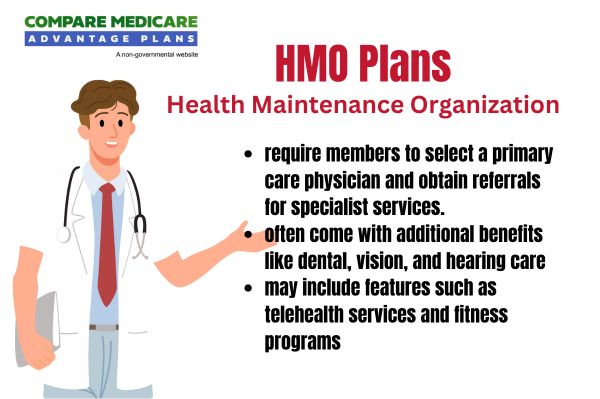
HMO plans typically require members to select a primary care physician and obtain referrals for specialist services. These plans combine hospital and doctor coverage into one plan. Members may be required to use a network of doctors and hospitals, which could potentially reduce costs and may feature lower deductibles for certain in-network services.
PPO Plans
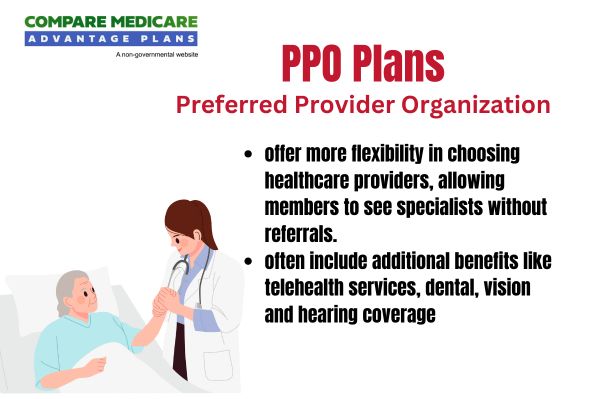
PPO plan offers more flexibility in choosing healthcare providers, allowing members to see out-of-network doctors at a higher cost. Unlike HMO plans, PPOs do not require referrals for specialist visits, providing greater freedom in accessing healthcare services.
This flexibility could make PPO plans appealing to those who seek more control over their healthcare options.
Special Needs Plans (SNPs)

Special Needs Plans target individuals with chronic conditions, disabilities, or dual eligible special for Medicare and Medicaid, providing tailored healthcare support. These plans likely ensure members receive specialized treatment through focused care and support. SNPs are divided into three main categories: Chronic Condition SNPs (C-SNPs), Dual Eligible SNPs (D-SNPs), and Institutional SNPs (I-SNPs), each addressing different special needs.
SNPs must adhere to standard Medicare Advantage program regulations, ensuring compliance with guidelines from the Centers for Medicare & Medicaid Services. Established under the Medicare Modernization Act, SNPs have been helping individuals requiring specialized care since 2006.
Overview of Colorado Medicare Advantage
Medicare Advantage plans in Colorado could potentially offer a robust alternative to Original Medicare. Some plans may provide additional services and benefits, such as vision, dental, and hearing coverage. Certain plans may also integrate prescription drug coverage, likely promoting better health outcomes through coordinated care.
Combining these potential benefits under one health plan, Medicare Advantage plans could offer a compelling option for many Colorado residents.
Covered Services and Potential Benefits
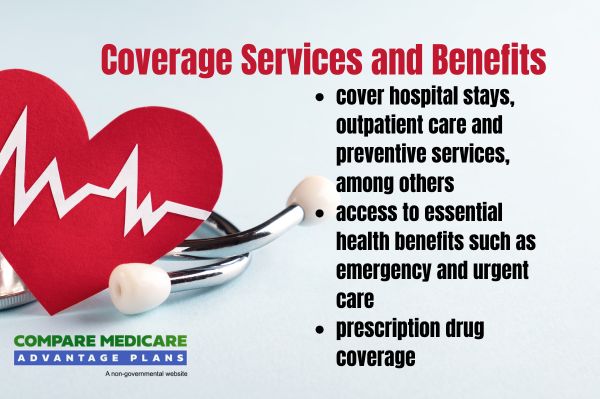
Medicare Advantage plans typically cover hospital stays, doctor visits, preventive services, and emergency care. Some plans might include additional benefits like vision, dental, and hearing services. Prescription drug coverage may also be included in these plans, although specific medications covered might vary. Some plans may require prior authorization for certain treatments, meaning you might need approval before proceeding with particular procedures.
Enrollment Process for Colorado Medicare Advantage Plans
You can enroll in Colorado Medicare Advantage Plan by using this website or by calling one of our licensed agents at 1-833-641-4938 (TTY 711), Mon-Fri 8 am-9 pm EST.
When to Enroll
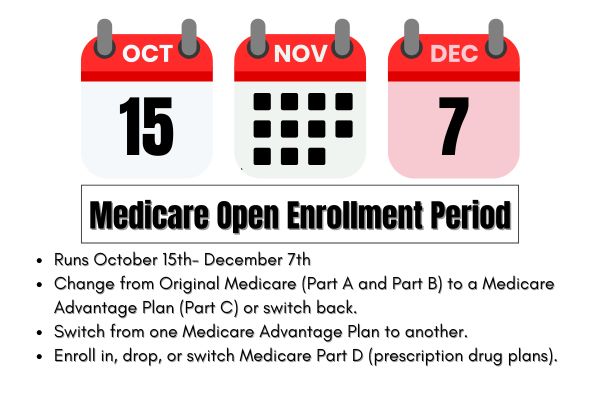
Enrollment in Medicare is encouraged during the Initial Enrollment Period, spanning seven months around the 65th birthday. This period allows new beneficiaries to sign up for Medicare Parts A and B and choose a Medicare Advantage plan that fits their needs.
Different Enrollment Periods
Specific enrollment periods include the Annual Open Enrollment Period from October 15 to December 7, allowing individuals to enroll or switch plans. This period allows beneficiaries to review their options and make changes to their Medicare coverage. New Medicare beneficiaries can enroll within three months before or after their Medicare Part A and/or Part B start date during the Initial Enrollment Period.
During the Open Enrollment Period from October 15 to December 7, individuals can join, switch, or drop Medicare Advantage Plans. The Medicare Advantage Open Enrollment Period runs from January 1 to March 31, allowing members to switch or return to Original Medicare.
Special Enrollment Periods are available for those experiencing significant life changes, such as moving or losing other coverage.
OEP, AEP, Special Enrollment
Special Enrollment Periods allow individuals to enroll or change their plans outside of the regular periods due to qualifying life events such as moving or losing other coverage. The Medicare Advantage Open Enrollment Period allows changes from January 1 to March 31 for those already enrolled in a Medicare Advantage Plan.

The Annual Enrollment Period (AEP) runs from October 15 to December 7, allowing individuals to enroll in or switch their Medicare plans. In some cases, individuals may qualify for multiple Special Enrollment Periods, allowing them to switch or enroll in Medicare plans under specific circumstances.
Medicare coverage usually starts the month after a beneficiary makes a plan change during a Special Enrollment Period.
Potential Costs Associated with Colorado Medicare Advantage Plans
Medicare Advantage plan costs in Colorado may vary widely based on location and specific coverage options. Costs might include premiums, copayments, and out-of-pocket maximums.
Out-of-Pocket Maximums
Some Medicare Advantage plans may include an out-of-pocket maximum, which could potentially limit the total costs an enrollee pays for covered services annually. This limit could provide a financial safety net, possibly ensuring beneficiaries are not overwhelmed by unexpected medical expenses.
Covered Services and Potential Benefits
Medicare Advantage plans in Colorado typically cover hospital stays, outpatient care, and sometimes additional benefits like vision, hearing, and dental care. Coverage options may vary significantly by plan, especially regarding specifics of additional benefits. Certain Medicare Advantage plans may also include prescription drug coverage, which could be bundled into the overall health plan.
How to Qualify for Colorado Medicare Advantage Plans 2026
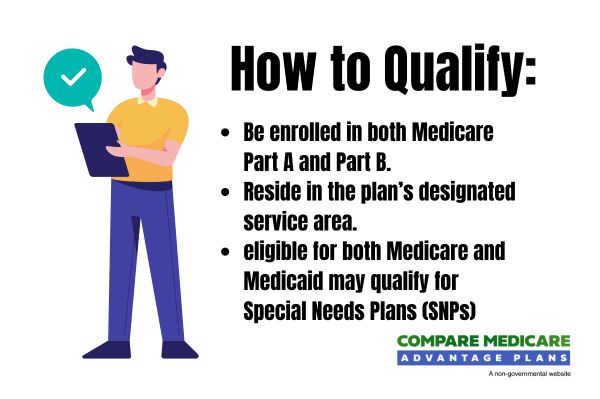
Individuals eligible for Medicare can enroll in a Medicare Advantage plan if they have both Medicare Part A and Part B. To qualify, applicants must reside in the service area of the Medicare Advantage plan they wish to enroll in.
Newly eligible individuals can enroll during their Initial Enrollment Period, spanning seven months. Special Enrollment Periods may be available for individuals who experience qualifying life events, such as moving or losing prior coverage.
Typically, enrolling in a Medicare Advantage plan requires applying directly with the insurance provider or through Medicare.
Comparing Colorado Medicare Advantage Plans to Original Medicare
Some Colorado Medicare Advantage plans may include additional benefits like vision, hearing, and dental coverage not provided by Original Medicare.
Cost Comparisons
Medicare Advantage plans may have lower premiums but may also include additional out-of-pocket costs compared to Original Medicare. Certain plans may also have lower out-of-pocket costs for certain services compared to Original Medicare, although they may require beneficiaries to use a network of providers.
Emergencies and Referrals

In HMO plans, members are usually required to use a specified network of local providers for care, except in emergency situations. Certain HMO plans may allow members to seek specialty care without needing a referral.
PPO plans could provide greater flexibility by allowing members to access both in-network and out-of-network services without referrals for specialty care. Emergency services are typically covered without requiring prior authorization, regardless of network restrictions.
Summary
As we conclude this comprehensive guide, it’s clear that Colorado Medicare Advantage Plans could offer a robust array of additional benefits and cost-saving opportunities compared to Original Medicare. From understanding the different types of plans available to navigating the enrollment process and potential costs, this article aims to equip you with the knowledge needed to make informed healthcare decisions. Remember, choosing the right plan could significantly impact your health and well-being, so take the time to review your options carefully.
Frequently Asked Questions
→ What are the eligibility requirements for Colorado Medicare Advantage plans?
To be eligible for Colorado Medicare Advantage plans, you must have Medicare Parts A and B and live within the plan’s service area. This ensures you receive tailored healthcare options suited to your location.
→ When can I enroll in a Colorado Medicare Advantage plan?
You can enroll in a Colorado Medicare Advantage plan during the Initial Enrollment Period, from October 15 to December 7 during the Annual Open Enrollment Period, or during a Special Enrollment Period if you experience qualifying life events. Ensure you check your eligibility to make the most of these options.
→ What types of additional benefits could Colorado Medicare Advantage plans offer?
Some Colorado Medicare Advantage plans may provide additional benefits like dental, vision, and hearing services, as well as prescription drug coverage. These potential benefits may enhance your healthcare experience beyond what Original Medicare offers.
→ How do HMO and PPO plans differ in terms of provider flexibility?
HMO plans limit you to a network of providers and require referrals for specialists, offering less flexibility. In contrast, PPO plans allow you to see both in-network and out-of-network doctors without needing referrals, likely providing greater freedom in choosing healthcare providers.

ZRN Health & Financial Services, LLC, a Texas limited liability company




